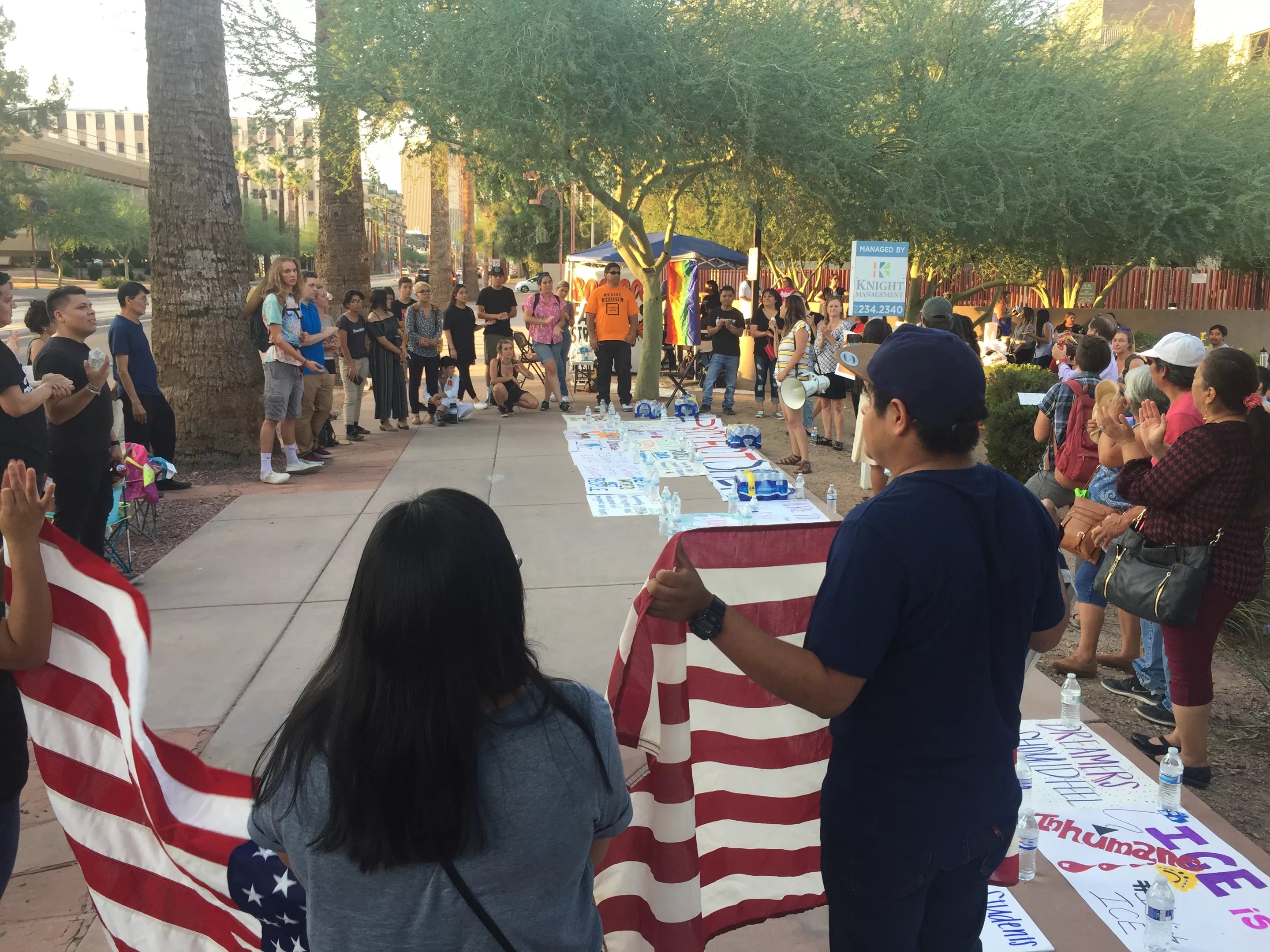
Antonia Farzan

Audio By Carbonatix
On Tuesday morning, as local immigrant rights groups protested the White House’s decision to end DACA, a young woman with curly hair and a teal T-shirt stood on the sidewalk looking slightly lost.
An older white woman in a floral top walked up to her. “Are you a Dreamer?” she asked.
The younger woman nodded. Her eyes were red from crying.
“I’m with you,” the white lady told her, reaching out and grabbing her arm. “I want you to stay. I’ve written to my senators this morning, and to Sessions.”
The young woman stared down at the ground, looking like she’d rather be anywhere else.
“Are you from Mexico?” the white lady asked her.
She nodded again, without making eye contact.
“A lot of people are from South America,” the white lady informed her, presumably under the impression that she was being helpful in some way. The young woman in the teal T-shirt politely excused herself and disappeared into the crowd.
Undoubtedly, Flower Shirt Lady meant well. But she failed to pick up on the fact that the woman was not in the mood for small talk – understandably, seeing as she’d just had her entire life upended. And getting womansplained to about the fact that some undocumented immigrants are from South America (wow, crazy, who knew???) can’t have helped either.
Not to mention, sending a letter to Attorney General Jeff Sessions probably isn’t going to accomplish much.
Still, who among us hasn’t been Flower Shirt Lady at one point? It’s devastating to sit back and watch as Dreamers are being encouraged to get help if they’re considering suicide because our government seems hellbent on preventing them from ever becoming full legal citizens. And when you’re coming from a position of relative privilege (in this case, having the luck of being born a U.S. citizen) it’s easy to become so racked with guilt that you just start flailing.
So, with that in mind, here are a few ways that you can help DACA recipients here in Arizona.
1. Donate to a DACA application renewal fund.
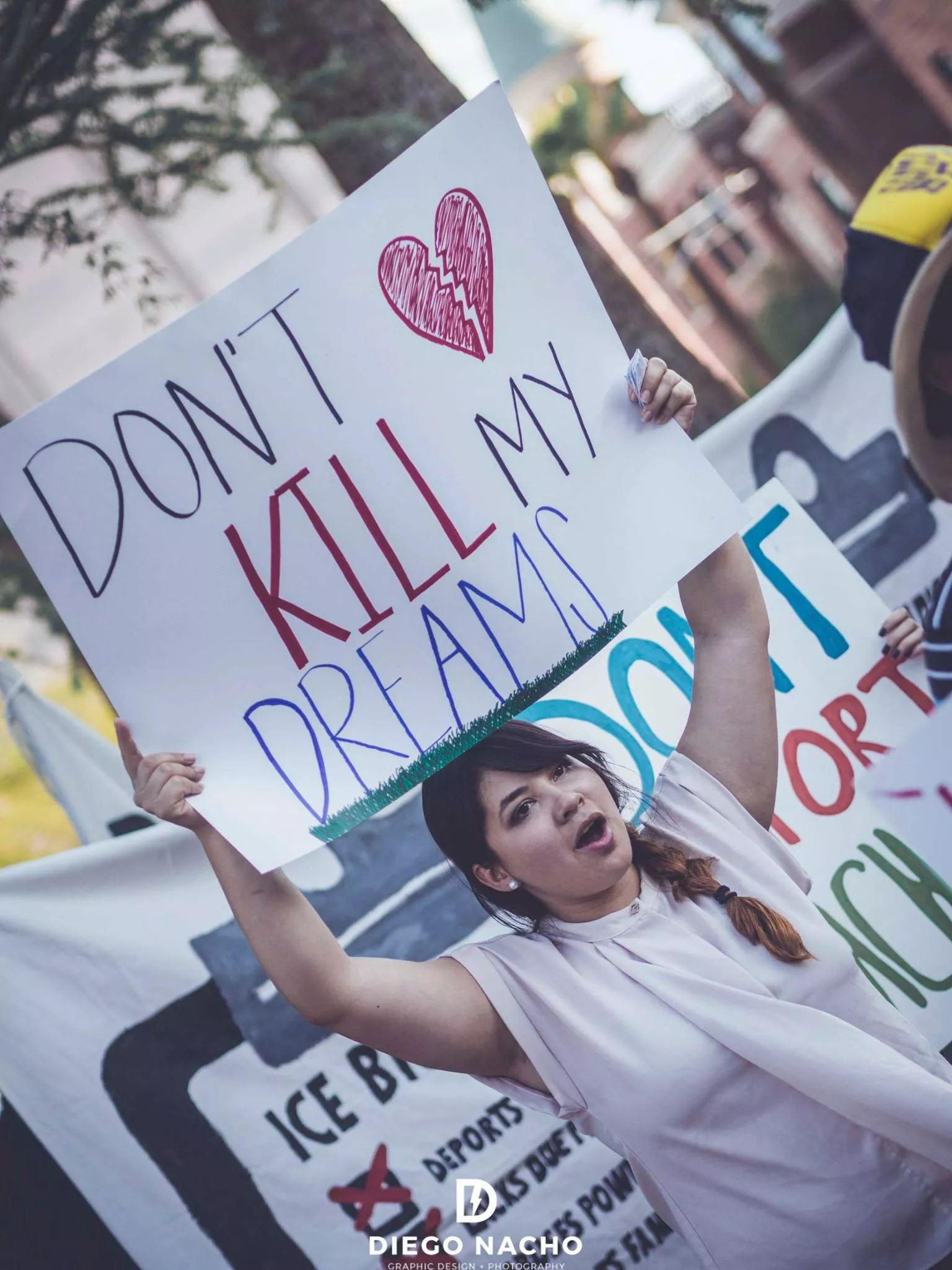
Courtesy of Diego Lozano with Aliento
Since DACA is being phased out over the course of six months, people whose permits are set to expire prior by March 5, 2018, still have the option to renew for another two years.
However, they have to get their paperwork in by October 5, and simply filing the application with U.S. Citizenship and Immigration Services costs $495 – on top of any lawyers’ fees.
With less than a month to go, Puente Human Rights Movement has started a dedicated DACA application renewal fund for their members. You can donate here.
A number of other grassroots organizations, including Aliento, the Center for Neighborhood Leadership, CAIR-AZ, Undocumented Students for Education Equity, Mi Familia Vota, and Trans Queer Pueblo have also set up a joint fundraiser for DACA renewals. Donate here.
In both cases, the organizations will do all the vetting to make sure that the money goes to someone who’s actually eligible to renew, so that you don’t have worry about trying to verify the legitimacy of random YouCaring and GoFundMe pages set up by people who claim to be raising money for their application fees.
2. Talk to your people.
On Tuesday afternoon, local activist Maxima Guerrero wrote a public post on her Facebook page that’s since been shared hundreds of times.
Titled “How to literally in this moment support DACAmented folks,” it’s worth reading in full, but this point deserves special emphasis:
“Speak up to your people. Clear up misconceptions about immigrant/migrant/undocumented community when you read/hear them. Being directly impacted and having to constantly defend ourselves day in and day out is exhausting, being an ally means to start speaking the truth to your circles and demystifying assumptions. There is no room for middle ground, no room for simple social media posts without action.”
Living in Arizona means you don’t have to look far to find someone spewing misinformation about Dreamers, such as the all-too-common claim that they’re “freeloaders” who don’t pay taxes. (This is completely false, as Belen Sisa, the co-founder of Undocumented Students For Education Equity at ASU, pointed out in a viral Facebook post this spring.)
Here are a couple of resources that can help you prepare for the inevitable arguments:
• Define American, a nonprofit focused on advocating for immigrants, has a downloadable one-page explainer about what DACA is and isn’t.
• This FAQ from immigration reform group America’s Voice explains what the White House’s recent announcement means.
• A Twitter thread from Utah-based activist Ciriac Alvarez debunks many of the common misconceptions about DACA.
• Dara Lind, who does consistently excellent immigration reporting for Vox, put together this comprehensive explainer on DACA, which will likely answer any lingering questions.
3. Join a local advocacy group.
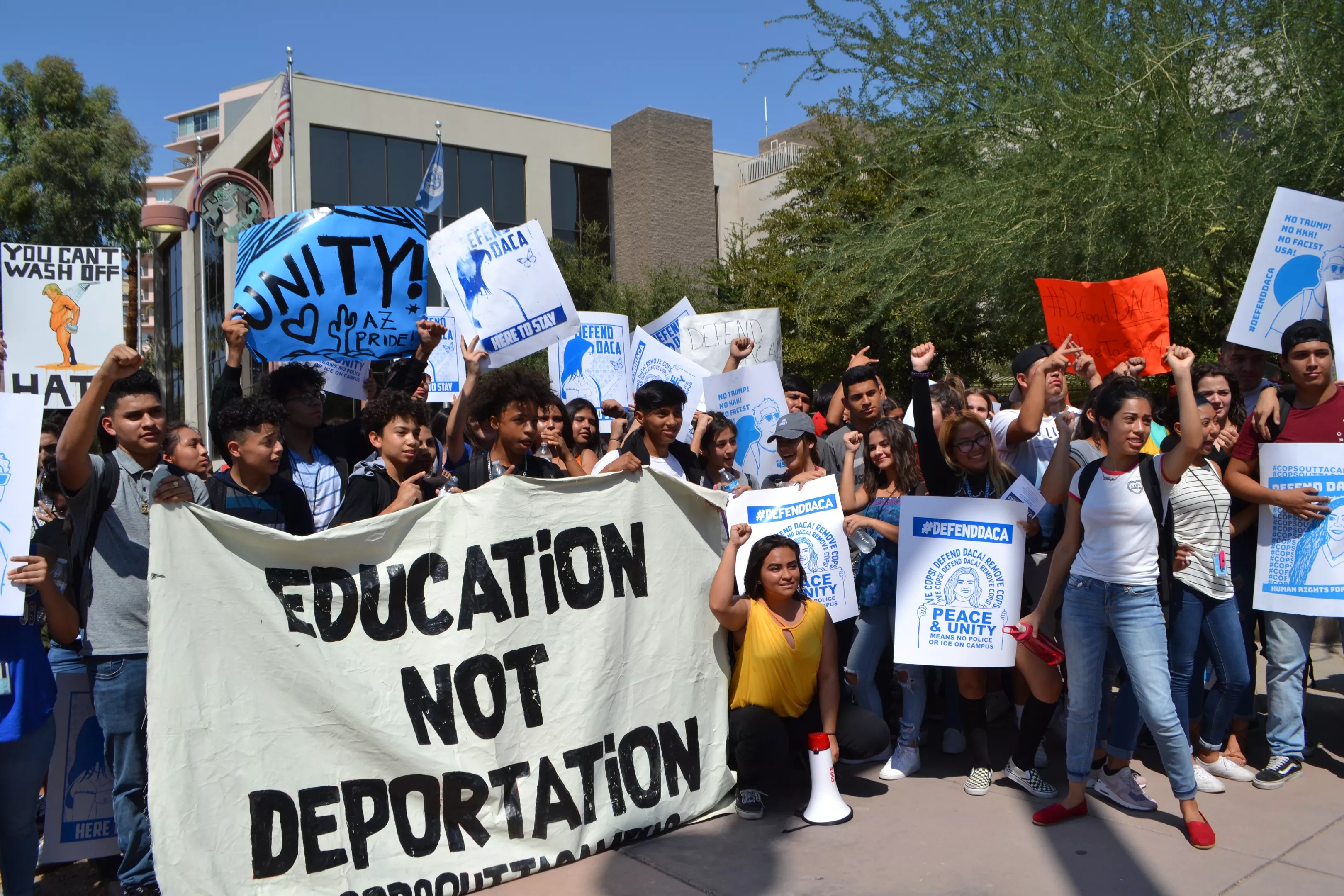
Lindsay Moore
If the last few days inspired you to take matters into your own hands, stop and pause for a moment. Whatever great plan you just came up with to support DACA students? Someone has probably thought of it before. And there’s probably a reason why it didn’t work.
Groups like Aliento, LUCHA, Puente, Trans Queer Pueblo, Arizona Center for Neighborhood Leadership, and the Arizona Dream Act Coalition already know what their communities need. They do a lot of behind-the-scenes work that most people never get to hear about. Many of them are led by DACA recipients. You can be a lot more effective if you simply show up, listen, and join their existing advocacy efforts.
Want to channel your frustration into helping people register to vote? Get in touch with Mi Familia Vota and ONE Arizona.
In addition, all of the groups mentioned above could use your financial support – even if it’s something as small as buying a few cases of water and bringing them to a protest.
4. Ask your Congressional representatives to support the DREAM Act.
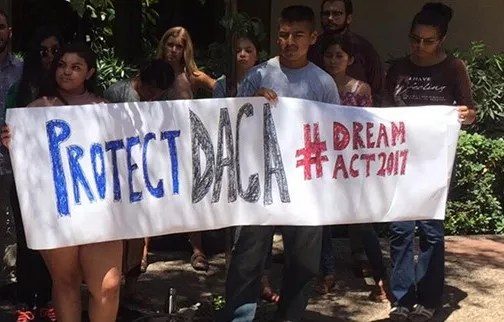
Courtesy of Diego Lozano/Aliento
Congress has six months to accomplish what it’s spent the past 16 years failing to do: Passing the DREAM Act, which would allow undocumented immigrants who came to the U.S. as children to become conditional permanent residents.
Here’s where Arizona’s congressional delegation stands:
Representatives Ruben Gallego, Raul Grijalva, Kyrsten Sinema, and Tom O’Halloran, and Senators John McCain and Jeff Flake have all stated support for passing the DREAM Act. The question at this point is what kind of compromises they’ll be willing to agree to in order to make that happen: Politico reports that some Republicans won’t be willing to consider supporting the bill unless it also includes provisions that address border security.
Andy Biggs, Trent Franks, and Paul Gosar haven’t explicitly said that they won’t support the DREAM Act, so it’s worth giving them a call. None of them are exactly pro-immigrant, however. Franks said in a statement recently that he believes “the DACA program should never have existed,” and voted against the DREAM Act in 2010.
Likewise, Biggs applauded Trump’s decision to repeal DACA, writing, “There is a serious discussion to be had about immigration reform in America. However, it must only come when we have fulfilled our promises to secure the border and enforce all current immigration laws.”
And Gosar – who on Tuesday morning tweeted with barely concealed glee, “I agree with @POTUS that it’s time to get rid of #DACA!” – introduced legislation last year that would have prevented undocumented immigrants from serving in the U.S. military. So it’s pretty clear where he stands.
The two wild cards are David Schweikert and Martha McSally. Back in 2012, Schweikert introduced a bill intended to prevent DACA from taking effect, but he’s been weirdly silent on the subject lately. In fact, on Tuesday morning, minutes after the White House announcement, he was posting about … cryptocurrency?
Meanwhile, McSally is one of the co-sponsors of the Recognizing America’s Children (RAC) Act, a GOP-backed alternative to the DREAM Act, which says that the government can take legal status away from Dreamers who drop out of school or become unemployed. Whether she could potentially be convinced to support the DREAM Act, if it comes up for a vote, remains to be seen.
5. Also, tell local elected officials that you want an end to “broken windows” policing.
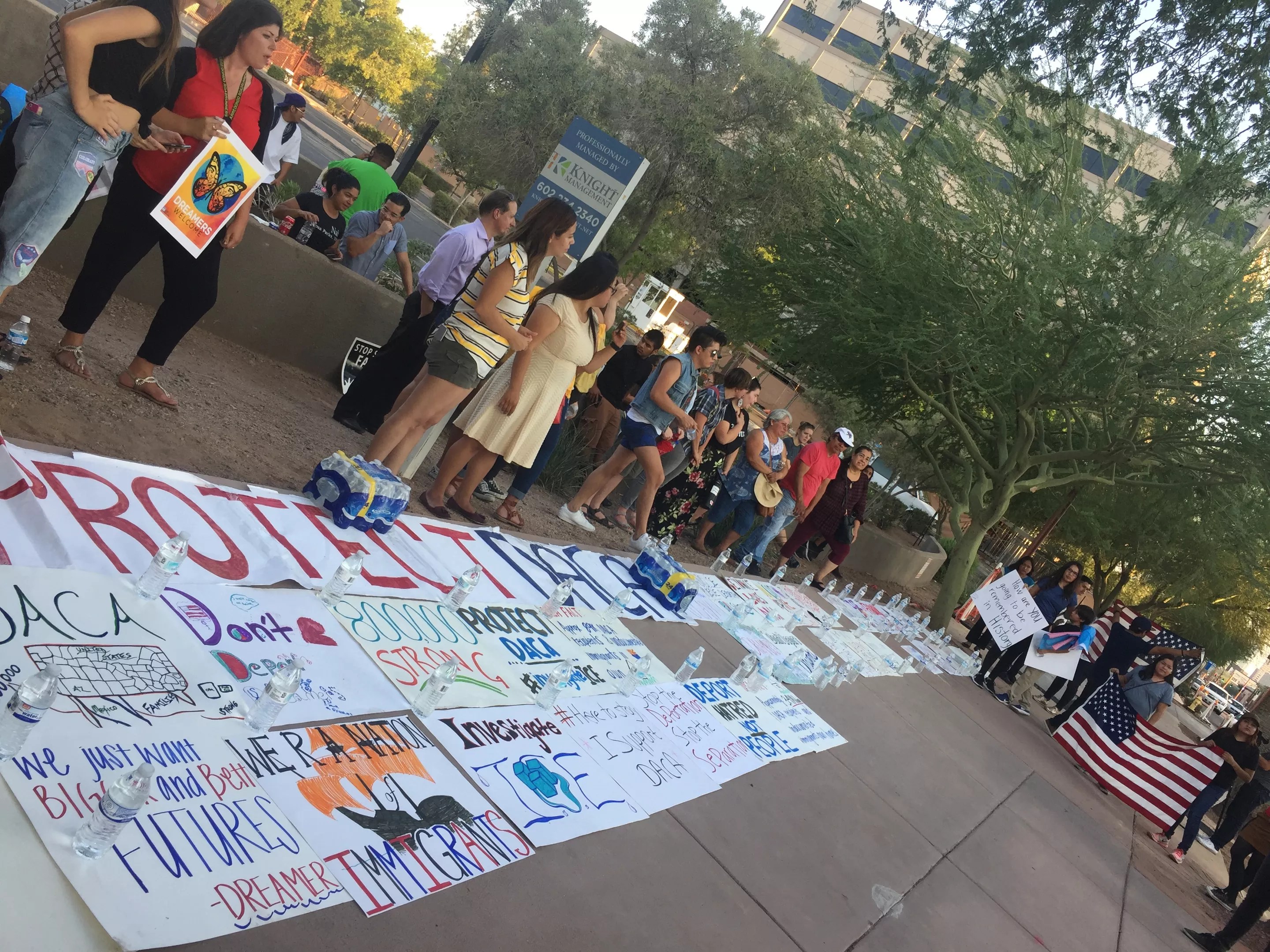
Antonia Farzan
In order to apply for DACA, Dreamers had to give the U.S. government a lot of personal information – such as where they live, work, and go to school. That same information could now theoretically be used to track them down and deport them.
Will that actually happen? Maybe not: Leaked memos show that the White House is hoping that Dreamers will self-deport. (Let’s just pause for a second to acknowledge that all of this is crazy and feels a lot like ethnic cleansing.)
However, as one immigration attorney recently explained to the Daily Beast, “Any DACA recipient who gets arrested by police will be vulnerable to deportation. That’s because police alert a host of federal agencies, including ICE, when they make arrests. ICE officers will then be able to ask USCIS if people who were arrested have received DACA – and, thus, are in the U.S. illegally.”
The key, he added, “is doing everything you can to avoid interactions with the police.”
That’s a tough thing to do if you live in a low-income neighborhood or are a person of color. Recently, one Phoenix man wound up in ICE custody after he failed to buy a light rail ticket. Police in Tempe and Mesa have also been cracking down on jaywalking over the past few months. It’s often these kinds of minor, nonviolent offenses that lead interactions with the police.
Other cities have started to realize that protecting undocumented immigrants means making sure that they don’t get arrested for so-called “victimless crimes.” Back in January, the Los Angeles City Council voted unanimously to decriminalize street vending. Meanwhile, New York is moving away from prosecuting people who jump the turnstiles to avoid paying the subway fare.
Unfortunately, the powers that be in Phoenix (and Mesa and Tempe) don’t seem to have gotten the message yet. So right now is a good time to contact the mayor and everyone on the city council, and let them know that you’d like to see police spend considerably less time looking for alleged violations of low-level nonviolent offenses. Bonus points if you manage to find a statement that one of them put out in support of DACA recipients, and remind them about it.
While you’re at it, call up your local police department (ask for Community Relations) and tell them the same thing. If you’re in Phoenix, you can do so in person: All through September, the Phoenix Police Department will be holding a series of community listening sessions that are open to the public.
And think twice before you call the police on someone else. Here’s a list of alternatives.
6. Help fund college scholarships for undocumented students.

Antonia Farzan
For several years now, whether or not DACA recipients qualify for in-state tuition at public colleges and universities in Arizona has been the subject of a drawn-out legal battle between the state (which says they don’t) and the Maricopa County Community College Board (which says they do.)
The state’s lawsuit, which dates back when Jan Brewer was governor, got sent to the Arizona Supreme Court earlier this summer, and will probably continue to be a waste of taxpayer money even as DACA is phased out over the coming months.
Meanwhile, undocumented high school students who’d been planning to apply for DACA no longer have that option, meaning that they’ll have to pay out-of-state tuition regardless of what happens with the court case.
They also don’t qualify for federal financial aid, and usually aren’t eligible for private loans. So, in other words, the only help that they can get comes from scholarships.
Unfortunately, while it’s easy to find lists of scholarships that don’t ask about immigration status, finding scholarships that are explicitly for undocumented students is another story altogether. (So next time you get an annoying fundraising appeal from your alma mater, tell them that you’ll donate … to a fund for undocumented students, when they set it up.)
In the past, Dreamers who attend ASU and a few other local community colleges have been able to apply for grants from TheDream.US, which promises that 100 percent of all donations go directly to students’ educational expenses. However, it’s not clear what will happen to the program when DACA comes to an end. The organization’s official statement only says that it will continue to support students who have already been awarded scholarships.
In a recent email to the campus community, ASU president Michael Crow wrote that “discussions have been ongoing,” which tells us absolutely nothing. In a grim aside, he added, “They have also said that, if need be, they will make scholarships available for ASU’s online program.”
That leaves us with one place where you can send your money: Prescott College, which offers a full scholarship to one undocumented student each year, funded by a $30 fee that every student pays at the start of the semester. The school is hoping to raise money to expand the program, and you can donate here.
If you’re aware of other scholarship opportunities for undocumented students in Arizona (or you have suggestions for this list) please email antonia.farzan@newtimes.com.